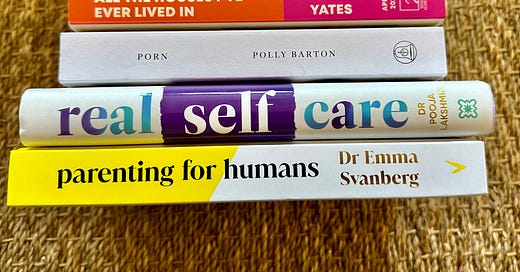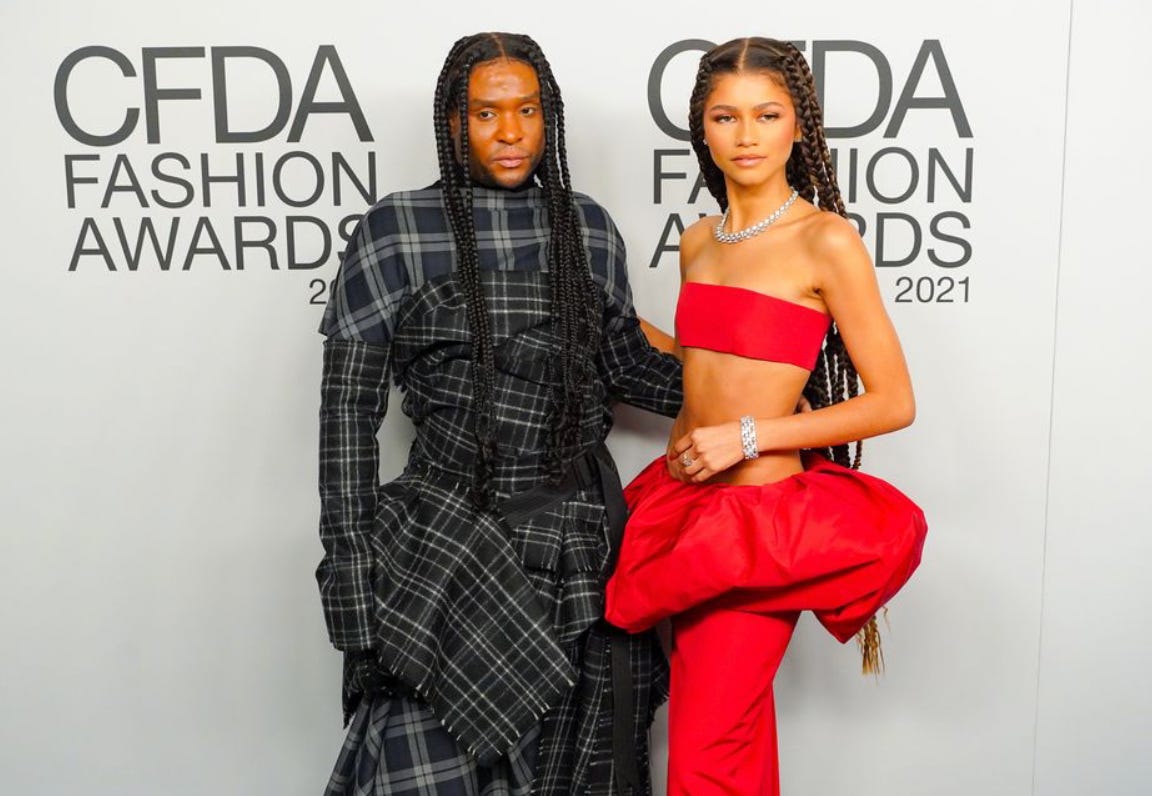New non-fiction to stretch + sate your 🧠
Plus, a pod I guested on about how we consume the news, the love/hate phenomenon of A Little Life + the best celeb interview I've read this year
Hi friends! I’m on maternity leave for a little bit so the next half dozen newsletters have been mostly written in advance. If this does not make sense, or I don’t get back to your comment/ e-mail, pls 4give me.
Today! Some brand new non-fiction. I like to have a non-fic and a fic on the go at the same time as they scratch different itches. Here are some of the ones I’ve been dipping into and folding down lots of pages (always a sign that something is of genuine utility). They’re a combo of memoir, self-help and polemic.

Fat Talk: Coming of Age in Diet Culture by Virginia Sole Smith The author of Burnt Toast - one of my favourite newsletters, which I mentioned a few newsletter ago re: Ozempic (this iv with her by Amy Odell is a good primer into her work) - is bringing out her book at a smart moment, as myriad pieces about the ‘return to thinness’/ Size Zero 2.0 etc etc swirl. (Did it ever go away? I don’t think so, and neither does Sole Smith.)
Fat Talk confronts fat phobia, the limits of body positivity, why BMI is an inaccurate measure of health, why diets don’t work, the difference between being fat and being unhealthy and how to raise kids who do not see “their body size as their value”. Hard recommend.
Real Self-Care by Pooja Lakshmin I first encountered clinical psychiatrist and women’s health doctor Lakshmin when I read her NYT piece about female burnout - I then interviewed her for Doing It Right in 2021 about what ‘real self-care’ looks like. Now she’s expanded her thinkings into a book, where she eschews the “breezy fixes” of wellness (which “we turn to… out of the desire to escape ourselves”) in favour of solid boundaries and aligning with your internal values. (It’s not an abstract self-help - she frequently offers up her own life experience and fallibilities - nor, as discussions of these themes too frequently are, is it flimsy or cheesy.)
I particularly like her tip, “don’t go to the hardware for milk” which is a reminder not to seek permission to implement boundaries. Her recent NYT piece on how to escape faux self-care, will give you a good taster of the book.
Porn: An Oral History by Polly Barton A sexy title! And a sexy, visceral, eye-opening book for anyone curious about the private fantasies and shames of others. (If the success of Three Women is anything to go by - that’s a lot of us.) Barton spent a year having conversations about porn with twenty acquaintances, which are written up as individual chapters. Particularly interesting conversations are those with a “perennially single” woman in her late 30s who talks about “the tyranny of silence” around masturbation, a straight male in his early 80s who reveals what a watershed moment the publication of Lady Chatterley’s Lover was in the 60s for young people, and a trans man in his 30s with a burping fetish.
Parenting for Humans: how to parent the child you have, as the person you are, by Emma Svanberg I first met clinical psych and the founder of Make Birth Better Emma Svanberg last year when I interviewed her for the NSPCC, about brain-building tips for your baby. I loved how compassionate she was about how futile it can feel communicating with a non-verbal donut, when you’re exhausted. Her new book is galvanising and helpful - less a ‘how to’ in the style of Now Say This and more of a holistic guide to learning about yourself as a parent and your child as a person. Has loads of really useful tips, particularly for early years parenting.
All The House I’ve Ever Lived in: Finding home in a system that fails us, by Kieran Yates I actually read this one in two sittings, because it’s so incisive and well-written, it’s hard to put down. Yates, a music journalist, lived in 25 houses before the age of 25 - from a council estate in London to a car showroom in rural Wales - and All The Houses… is a memoir of Britain’s 30 year long housing crisis.
Political negligence, the epidemic of mould and the architecture of communal experience mixes with beautiful observations about what regular displacement - the grief of permanent homesickness - does to a person. Stark history is interspersed with funny anecdotes and sweet memories, such as wearing her mum’s gold bangles when she washed the net curtains every week, so that she could pretend she was a grown up.
BITS
Journalism, pods, docs, tv, film, poems, memes & more
I interviewed the one and only Margaret! Atwood! last week in London, about her new short story collection Old Babes in the Wood. She was funny and wise and irreverent (making hand puppets for me backstage because of course, she is also a puppeteer) and held my hand while we walked off stage (for my stability, not hers) a gesture so lovely it made me want to weep.
I could write an entire newsletter alone on this goddess of an interview with Arnold Schwarzenegger aka “the ageing leviathan” by Mark Leibovich for The Atlantic. (The Atlantic is paywalled but you get a month free if you sign up.) He talks about his Nazi father, Gustav; the controversy when he signed “I’ll be back” in the Auschwitz guestbook (the museum defended him: he really is coming back, they said); and his affair with his housekeeper, which resulted in his son, Joseph and the breakdown of his marriage. “The fucking weenie gets hard and I fucking lose this brain” he explained, a sentence about which I have many, many thoughts.
The most enormous thanks also to Leibovich for reminding me of the greatest celebrity note ever left in a museum guestbook:
“Anne was a great girl. Hopefully she would have been a Belieber.”
Justin Bieber at The Anne Frank Museum, 2013.
Unmasking my Autism is tv personality Christine McGuinness’s second doc for the BBC about autism, and her first since she was diagnosed with autism aged 33. Watching her navigate her life as a newly single woman on the autistic spectrum determined to stop ‘masking’ is powerful, as is the segment with neuroscientist Francesca Happé about why girls and adult women are diagnosed so much less than men and the interviews with other autistic women, who discuss their sensory issues with food (and how they were often dismissed as “just an eating disorder”.)
I was shocked to hear of the retirement of celebrity stylist and self-described ‘image architect’ Law Roach last week. Responsible for the zeitgeist-shaping red-carpetry of Zendaya, Priyanka, Celine Dion and Anne Hathaway, he is to now, what Rachel Zoe was to the early 00s. In this interview with The Cut, he explains with rigorous honesty the highs and lows that led him to quit. In short (it is v long), the fashion and entertainment industries are no where near as inclusive as the magazine covers proclaim them to be.
My Mother, the Troll is a moving interview with Ben Leyland about his mother, Brenda, who committed suicide in 2014, after Sky News revealed that she had been sending hundreds of abusive tweets to the parents of Madeleine McCann. Thoughtfully and humanely - without ever letting her ‘off the hook’ - Leyland takes us through his mother’s life, and his relationship with her, to see how she became mired in a toxic internet conspiracy that eventually took her life.
Back in December, I guested on a series by Oliver Burkeman for Radio 4 called Living With The News (I only realised this week that it had come out) hooked to my piece on seeking out good news aka joyscrolling. We discussed how consuming the news has become a primary leisure activity, with the 24/7 news cycle sending our negativity bias into overdrive. When does ‘keeping informed’ tip into doomscrolling? Is consuming global news taking us away from local community? And could a diet of good and bad news ever be a mainstream alternative?
I cannot stop watching this incredibly awkward red carpet interview (the inverse of this viral meet-cute). The internet appears to be divided into those who think Hugh Grant is being rude/ Ashley Graham is under-prepared/ it’s just a culture clash. The disconnect is best reflected in the bit where Grant refers to the Oscars being like Vanity Fair, the 1848 novel by Thackeray and Graham thinks he means… the Vanity Fair after party. The best comment on YouTube:
“I’m just a girl, standing in front of a bot, trying to get him to speak a complete sentence.”
Inject The love/ hate phenomenon of A Little Life into my veins. As a fan of Hanya Yanagihara’s extraordinarily divisive book - which has sold over 2.5 million copies in the English language and opens as a play starring James Norton, today (I just booked tickets for the summer) - I am intrigued by the ongoing discourse around its literariness/ realism/ trauma/ queerness. I would highly recommend Alex Needham’s piece to both lovers and haters.
I enjoyed listening to Emily Oster on The Active Voice podcast, discussing the heat she takes for her work as the formative economist on parenthood. Oster’s books are such a necessary relief - particularly Cribsheet, because it replaces myth (of which there is so.damn.much around pregnancy and early parenthood) with data.
You and Me is schlocky, sweet and affecting. Harry Lawtey convincingly shucks off his coke-snorting banker in Industry to become Ben, a grieving young dad of two, who falls for Jess (Jessica Barden), struggling with her own grief. I think the show could have done without the curveball that comes half way through - their existing grief siloes are surely enough of a bulwark to burgeoning romance - but it’s otherwise highly bingeable. BRING TISSUES.








Last year, I got really into reading non-fiction at bedtime because I didn't get so plot-wired before trying to sleep. All The House I’ve Ever Lived in sounds amazing and makes me want to get back into this habit!
A couple of books and a documentary I'm going to look into! Thank you for your thoughtful recommendations Pandora!